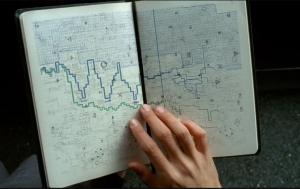Overthinking, doubting choices and regretting missed opportunities…we all do it…continually, everyday.
…the question is, why would anyone, and for no apparent reason, doubt and challenge a many-times proven routine and wonder whether a small adjustment might not make it even better?
An acquaintance of mine is in exactly this kind of situation. In reality, though, they’re faced with a double dilemma.
To begin with, there’s the matter of having to conceptually understand a problem, a calculus: how the numbers are aggregated; how to spot or identify permutations — even improbable ones— separate hot from cold data; and how sequencing (a particular order of values) is determined—or predetermined—and second-guess a pre-defined, but to them, unknown result.
Then, and this is more abstract, there’s the question of grasping the conceptual thinking that underlies a process they’re working on: decrypting and assimilating the system behind the process; analysing the reasons for wanting to review, and needing to retain cross references and correlations; taking into consideration the consequences of rethinking (doubting) a fact-proofed calculation simply because a second thought or a “what if” scenario seemed, a posteriori, a good idea.
A Momentary Lapse of Reason
Although it’s natural to want to second-guess or improve the likelihood of reaching the best outcome, is it really a good idea to start doubting hours of permutation study and the initial understanding of the logic behind the selection of numbers and combinations once they’ve been proven to be valid?
Essentially, there’s a chance of upsetting the concept of the operation —not to mention the logic behind needing to spend hours forecasting values —and at what cost to sanity? While doubts are beneficial, it is best to express them before concluding rather than after.
Of course, following a hunch or an intuition can produce surprisingly positive if unexpected outcomes, but this is precisely the moment when the chaos factor—all those inexplicable doubts and “what if” scenarios—you are trying to avoid the need for, through reasoned calculation, that so easily ruin hours of toil and deductive thinking.
Ultimately, it’s a bit like simultaneously trying to predict the weekly lottery while suppressing the urge to simply enter your date of birth.
My acquaintance’s dilemma is—having spent hours working on their calculus and having selected a reasoned set of values—whether, despite all logic, they should add their birthday month, because so far, results haven’t been as expected, so what difference would it make?

The board game the Japanese call “Go“
*
All this overthinking results in a loss of focus, not to mention a monumental headache. All this hesitancy about the work done—that is, to all intents and purposes, correct and doesn’t need to be improved upon—and whatever for? An illogical, inexplicable adjustment?
Like opponents in some Japanese strategy board game an inner debate us raging, Spock versus a mapcap fireclown. The arguments compete for dominance, with one insisting on maintaining reason and the other proclaiming that there is no better moment for a tiny, if tardy, adjustment because, well, who knows, it might just make things better, and there is always room for improvement, isn’t there?
Containing Chaos
Having acquired a certain understanding and enough knowledge of the task at hand to build a working methodology, you start to get an idea of how the system should work and, given the perceived logic behind it, stand a good chance of achieving the required results.
It may even be acceptable to factor in errors. It may also be understandable, with an open mind and an understanding that whatever the precaution, as with my acquaintance, shit will happen. Might it not then, somehow, be possible to factor in the unexpected before it happens?
Ultimately, isn’t part of the issue in addressing any problem figuring out the error factor and acknowledging randomness—that is, incorporating a margin of error—into a system and doing away with the urge, a posteriori, to irrationally overthink everything?





You must be logged in to post a comment.